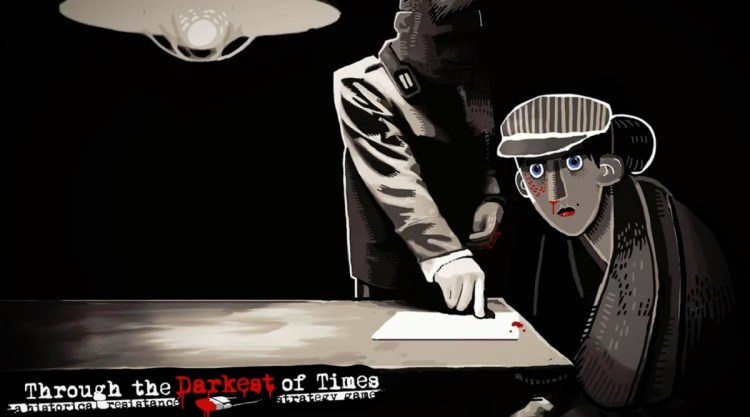Handy Games often publishes light-hearted mobile and virtual reality games. But the German game publisher, which was recently acquired by THQ Nordic, is the publisher of a new title dubbed Through the Darkest of Times.
It is being created by a Berlin-based studio dubbed Paintbucket Games, which includes former Yager developers who worked on Spec Ops: The Line: Jörg Friedrich and Sebastian Schulz. The game takes place in the darkest history of German, starting in 1933 when Hitler became chancellor.
The player takes command of a small resistance group, which resists the Nazi reign until the end of World War II. It’s a strategy game where small choices matter, as you have to gather support from the population by taking risks, but you can expose yourself to danger if you are caught. The game ends for one of your resistance members if the Gestapo comes knocking on your door.
I emailed the Handy Games CEO, Christopher Kassulke, about why he greenlit the title.
June 5th: The AI Audit in NYC
Join us next week in NYC to engage with top executive leaders, delving into strategies for auditing AI models to ensure fairness, optimal performance, and ethical compliance across diverse organizations. Secure your attendance for this exclusive invite-only event.
“As a German, long born after World War II, I had to answer often the question to foreigners around the world how that could have happened and why no one stood up against such an evil regime. When I look around the world not naming any specific country or president I have the feeling that we have not learned a lot from the history,” Kassulke said. “Games are one of the most powerful media of our current generation. You will think several times if your decision is right or not in Through the Darkest of Times.”
He added, “You will think so often how would I have reacted nowadays – would I really have done that? It is ‘just a game’ but so powerful and important. I heard from several publishers that the game is great but the topic is too complicated. In their opinion you just cannot do such a game, it would not sell well and partners and press will not support it. Honestly we as publisher had to do it and we as a team would do it again.”
I saw the game at PAX East and interviewed Florian Emmerich, a spokesman for Handy Games at the event in Boston. He told me that the team aims to educate the young German population — and others as well — about the importance of resisting evil. Under a new German law, the title allows the developers to use educational images of the swastika and references to Hitler, though the company cannot use those things in advertisements of the game. The game is coming in the winter of 2019 or 2020 on Steam for the PC.
Here’s an edited transcript of our interview.
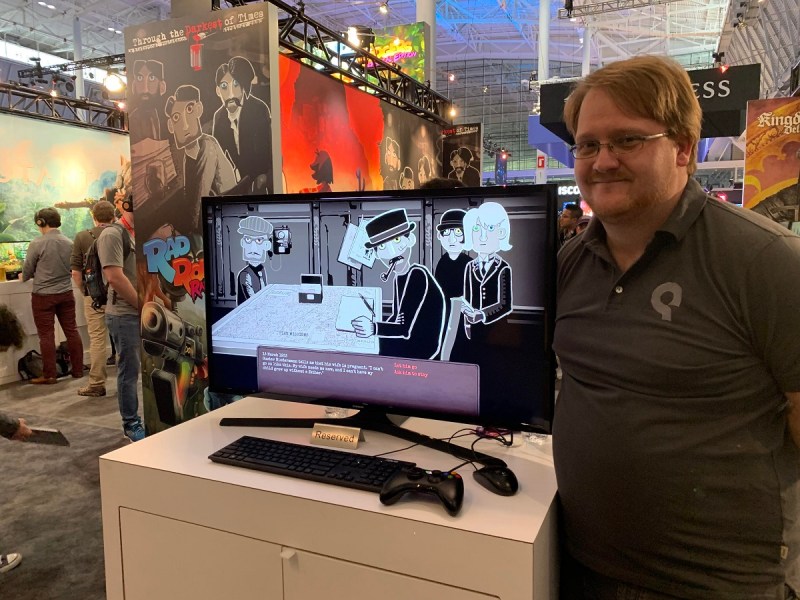
Above: Florian Emmerich is a spokesman for Handy Games, showing off Through the Darkest of Times.
Florian Emmerich: The story is quite simple. It’s 1933 in Germany. Hitler is becoming chancellor. Three guys decide, “No, we can’t stand this. We have to do something against this.” The developer is a newly-formed group of guys. They previously worked on Spec Ops: The Line for Yager Development. They’re in Berlin, where the game is based. They do a lot of research in Berlin, going to locations.
GamesBeat: Is it in all this animation style?
Emmerich: Yes, yes. That kind of Weimar style, between the first and second world wars. They had a distinctive art style. We’re a bit further ahead in the game here. It’s a strategy game, fundamentally. On a daily basis, you plan missions all over the city of Berlin. It’s all set in Berlin, no other places. The resistance group we have here, they’re not trained fighters. They’re a plumber, a workman, a lawyer, whatever. Just regular people saying that they have to stop this madness that the Nazis have become. They have to do something against it.
So what can they do? Just what regular people today would do. They can’t grab their guns and march in the streets. They’d find a whole army against them. They’re only a few people, so first, they want to convince other people that Hitler is a bad idea, that they need to do something against him. They want to get more supporters, more followers. They want to raise a bit of money. Then they’ll start with small actions like dropping leaflets, painting messages on walls, trying to get people to learn more about what the Nazis are up to.
We can send people here to go on this mission. Gameplay-wise it’s rather simple. It’s easy for people to get it. For us it’s more important to deliver a strong story. It’s all based on true events. The characters that we have are fictional, because they’re randomly generated — random names, random occupation. But they could have existed in a place like this. Thousands of people were killed by the Nazis as traitors, for being part of the resistance. The more you do, the more followers you get, the more options you have. In the end you can not only drop leaflets, but you can do things like sabotaging SA patrols, things like this.
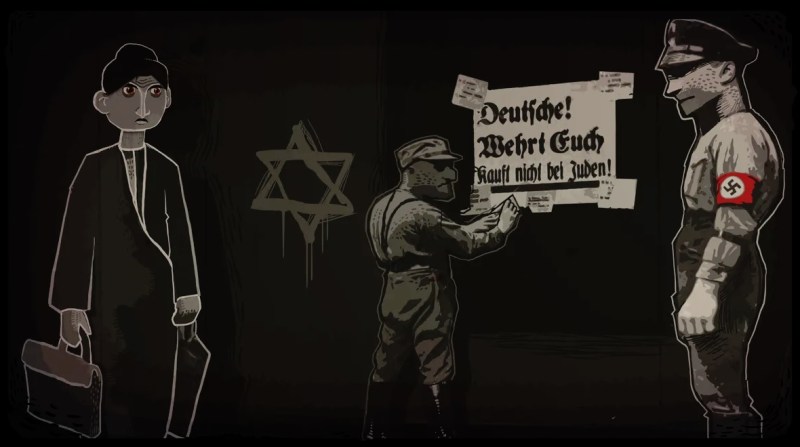
Above: You cannot change history in the first playthrough of Through the Darkest of Times.
GamesBeat: How big is the development studio?
Emmerich: They started out with only two, and now with us as publisher they’ve grown up to five people. It’s still a very small team. I’m working on both sides. I’m a PR manager for THQ, and now Handy Games is a daughter company, so I’m going over to Germany to work there and build up the PR department. At the moment I am the PR department. [laughs]
GamesBeat: Do you know why this sounded like an interesting thing for Handy to pick up?
Emmerich: We think it’s an important message. Both of the guys who started the game are very much against the rise of the right wing in Germany today. I don’t know if you’re familiar with the situation in Germany today, but we have our own hard right-wing party that’s getting more and more support, which a lot of people see as a bad thing in light of history. The right wing started to rise when you saw big waves of refugees coming into Germany from places like North Africa. A lot of people are against that, especially in areas where no refugees were before. You’ll have to ask a sociologist to break it down — it’s not really my topic — but it’s one of the problems we face in Europe.
One problem we have in Germany is that people tend to forget what happened. The younger generation isn’t as interested. If you turn on TV in Germany you’ll see plenty of documentaries about the Third Reich, but now that kids don’t watch TV anymore, they just think, “Why should I care? It’s almost 100 years ago.” We hope that with a game, we can reach at least a few more people.
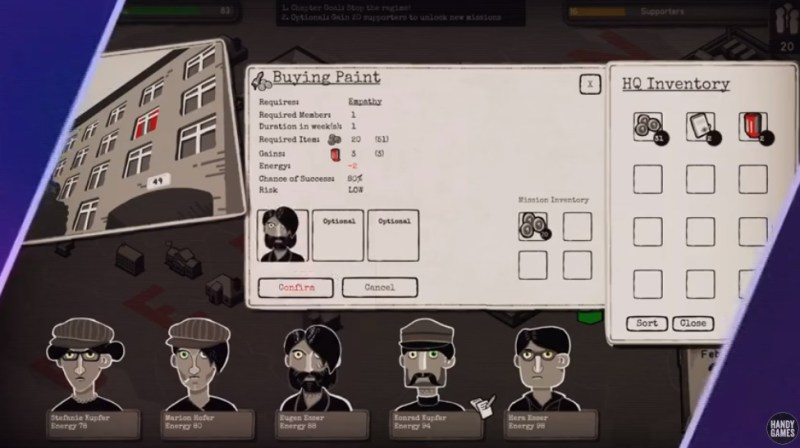
Above: Your job is to recruit more resistance members, but to also preserve morale by keeping them alive.
Also, it’s just an interesting topic. The way the Nazis are typically shown in games, you just see soldiers. They really could be anyone. They’re shooting at you and you shoot at them. Computer games don’t always show the monsters that were behind that. We wanted to step in and try to show more of that. It’s a strange thing to say about a game, but it’s not much fun. It’s a sad topic, basically. Your group is always on the brink of being discovered by the Gestapo. You always have to keep a balance between doing enough with your group to not become irrelevant—if you’re a resistance fighter that doesn’t actually do anything, nobody’s going to help you. But if you do too much, you draw the attention of the secret police.
This scene we’re looking at now, you know the Reichstag? It was burned down in 1933, and Hitler blamed the Communists, although it was never proven. Many people think it was done by Hitler’s party themselves as an excuse to introduce martial law. You see the building burning here. You hear all the voices talking about it. Every group that wasn’t to the Nazis’ liking, they were blamed for something and arrested or worse.
GamesBeat: As the story branches like this, is there eventually a choice you can make that leads to a better outcome?
Emmerich: The main goal is just to survive through the war to 1945, and while you’re surviving, to have as much impact as possible. We won’t allow you to entirely change history. We want to stick with true events when you play the game for the first time. When you play for a second time, though, we have a New Game+, if you will, and you can play in an alternate history mode. You can change history and see if you can’t end the war a bit early.
Here we can get in touch with a lot of different people. This guy is a veteran of WWI, talking about how the Communists did it. We want to give some of the feeling that was present at the time. And now the Gestapo are coming by. You have to keep your group’s morale up or it will start to dissolve, because people are too afraid. You can see that one of our guys was arrested, right here.
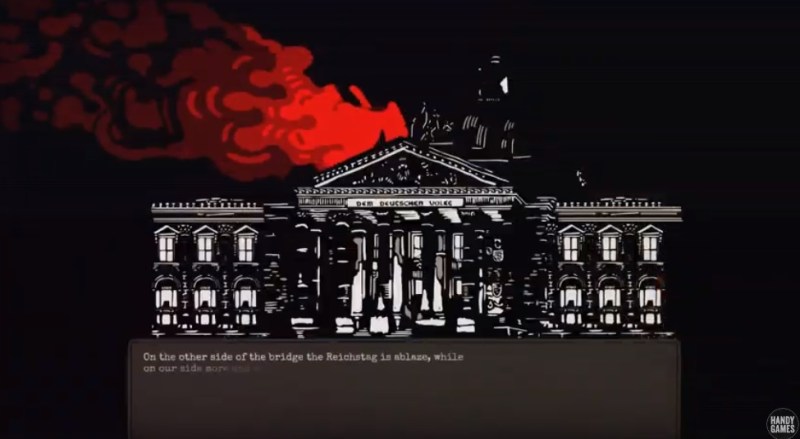
Above: Hitler blamed the burning of the Reichstag on the communists. That enabled him to declare martial law.
GamesBeat: Have there been many games in Germany itself that approach this period of history, this subject?
Emmerich: As far as I know, nobody’s done anything like this in the genre we’re pursuing, making a strategy. We chose this background because we think it’s necessary. We wanted to do that, as Germans, to create a game like this. There have been some good movies about that time in Germany. But we tend to avoid the topic in Germany, usually. We’re not allowed, in games, to even use Hitler’s name or show the swastika.
That’s changed a bit recently, though. Now, if your game has any kind of educational bent, you can use this material. If it’s “socially adequate.” That’s the term they use. I don’t know exactly what that means. [laughs] But we can use all that material. From our point of view, we need to name our enemy, not just do something to circle around it. In the last Wolfenstein, for example, when that was published in Germany, they didn’t use the name “Adolf Hitler.” He had some other name, and they even got rid of the mustache. It’s ridiculous. That’s not what we wanted, obviously. We think this is a very important and very interesting part of history.
The people you’re playing as part of your group can be social Democrats, they can be Communists, they can be Catholics or Jews. The Nazis attacked and suppressed a lot of different groups of people. You’re the leader of the group, and you send people out on missions. You can’t always predict the outcome. You’re taking a risk. For example, the missions marked in red here are all very risky. After the Reichstag fire you see a lot more troops out in the streets, patrolling the city. You have to choose — do I take this risk? Will my people get arrested when I send them on a vital mission? As I said, though, if you do nothing your group will just dissolve. If you’re a weak leader and don’t accomplish anything, people won’t follow you anymore.
GamesBeat: Does the government require any kind of checks or approvals to make this?
Emmerich: There’s an independent agency called the USK. It’s like the ESRB in America. They’re not a government agency, but they check every game that you bring to the German market. They arranged with the officials such that, in certain cases, games can show the swastika and so on. You can see this flyer here with an SA guy on it, and as you’d expect he’s wearing a swastika on his arm. We’re not actually allowed to print those flyers in Germany, because if you use it as part of advertising — even if it’s okay to use it in the game — that’s still forbidden by law. We still have to be a bit careful with what we do.
It’s always been okay to show that kind of thing in books and movies up to a point, but — was it Robert Harris who wrote the novel Fatherland? It had a swastika on the cover, and they were fined for that and it had to be taken out of every shop. You can have it inside the book, but not on the cover, because again, it can’t be used for anything that seems like advertising.
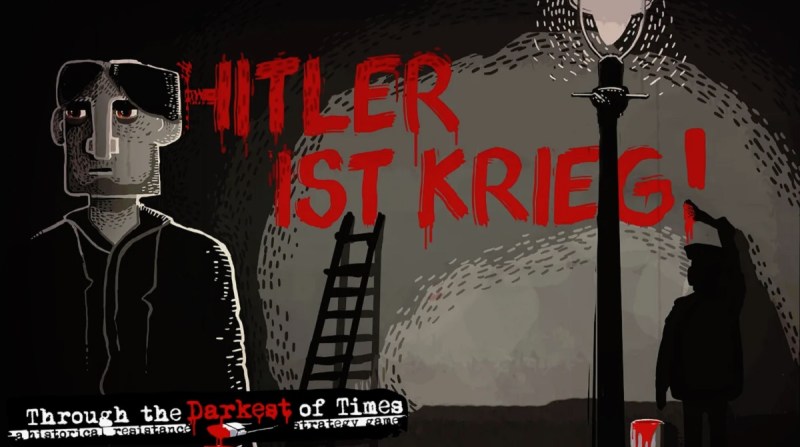
Above: You can create anti-Nazi graffiti like “Hitler is war” in Through the Darkest of Times.
GamesBeat: Is there a particular reason the strategy gameplay matched the story you wanted to tell? I suppose you didn’t necessarily want to do a shooter with this material.
Emmerich: Exactly. We wanted you to feel, in a lot of ways, powerless. In a shooter, you’re standing there with a gun and you can do something. Here it’s more about careful planning. It was the best way for us, we thought, to represent how this sort of thing was done. People met together secretly and discussed what they should do. “Maybe we should go to Potsdamer Platz and paint something on the wall. Maybe print off some leaflets and pass them out at the university.” We felt like this would be more like how it might have been. Making it into an action game would just feel strange.
GamesBeat: Was there any piece of writing or other work that served as a foundation for your research here?
Emmerich: There wasn’t any single book. We read a lot of different things. I studied history when I was at university in Germany, and my focus was the Third Reich. We had a whole library of nothing but books about the Third Reich, literally thousands of them. There’s a smaller amount of research about resistance groups, though. Most people know about groups like the 20th of July and Stauffenberg, the group that tried to assassinate Hitler. Maybe you’ve heard of the White Rose, the students in Munich that were dropping leaflets and were arrested in 1943. They were one of the ideas we had in mind.
But then we found out more about thousands of different people who resisted, many of whom were executed. You had a lot of examples of things like passive resistance. Workers in ammunition factories would work slower as a form of sabotage, and many of them would be questioned by the police just for that. The guys on the team all share what research they find, and sometimes it’s hard to read.
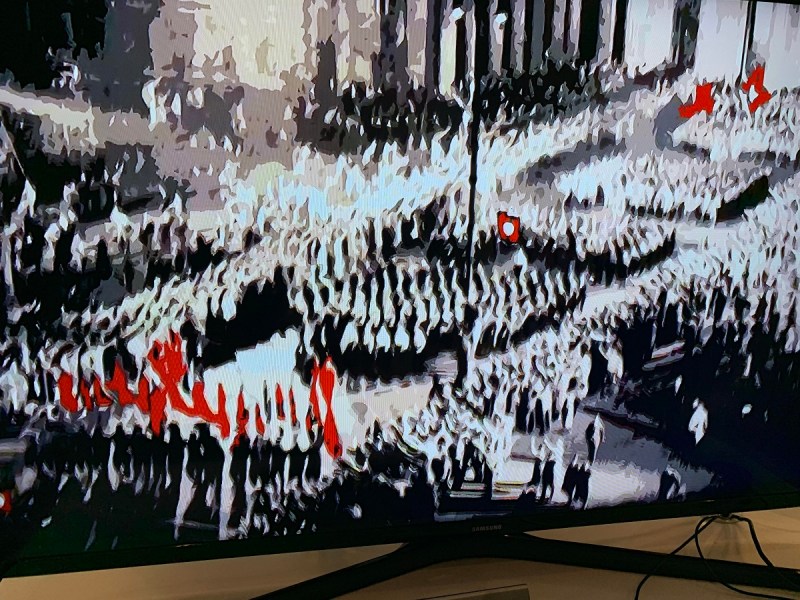
Above: A pro Hitler rally in Berlin in Through the Darkest of Times.
GamesBeat: You do PR, but do you have a role on the game as well?
Emmerich: I’ve advised them a bit based on my studies. I have a few things that I keep in mind. We talk quite often about it. For me personally, it’s an interesting and important topic. But their research is pretty strong, and I trust them fully that they’re doing a good job. They’re very careful as they take on the topic.
